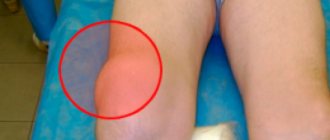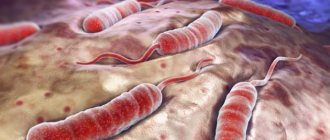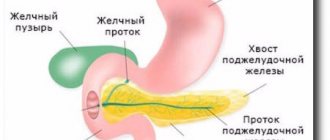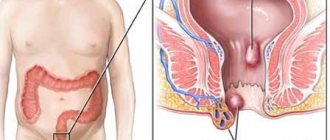Approximately 25% of women of reproductive age are characterized by sensitive ovulation (ovulatory syndrome). They are able to accurately determine the time of release of a mature egg based on the expressed pain. The pain can be aching, spasmodic (as during menstruation, but weaker), pressing. Most often, the lower abdomen or one of the ovaries pulls or bursts, and aching pain in the lower back or rectum is also possible. Its duration ranges from several minutes to two days, but more often 12-24 hours.
What is ovulation?
A woman's reproductive system consists of the uterus, fallopian tubes and ovaries (these organs also include the vagina and cervix). From the first day of menstruation, the follicle matures in the ovaries (the period takes an average of 14 days), then it ruptures and the egg is released.
This process is called ovulation. After this, the egg moves through the fallopian tubes for fertilization; if this does not happen, then after about 14 days menstruation begins and the cycle repeats.
Why does malaise occur?
The peculiarity of this type of ailment is that they last from 1 minute to 2 days - no more. Here are some factors that can provoke illness:
- The egg capsule stretched and ruptured.
- Fluid and blood came out, causing irritation, as well as discharge of various types.
- In an attempt to draw in the cell, the fallopian tubes begin to actively contract.
- The hormonal cycle is disrupted.
- Inflammation.
- Recent birth.
- Genetic predisposition.
Ovulatory pain – normal or pathological?
Ovulatory pain can be both normal and pathological. If pain during the period of ovulation in a woman is constantly present, without the presence of additional abnormalities in the body and recedes within 2 days, then there is no reason for concern.
But if the symptoms appear suddenly, the pain persists for more than 2 days, and additional signs are present, then a diagnosis from a gynecologist is required to identify a possible pathological cause.
Characteristics of symptoms
Painful ovulation (the causes can be physiological or pathological, which affects the characteristics of the symptoms) causes discomfort and can be expressed by the presence of the following symptoms:
- pain in the lower abdomen (cramping or cutting) on the right or left. Depends on which ovary the follicle has matured in. The duration of pain can be from 60 minutes to 2 days;
- increased sexual desire. This symptom is inherent in nature, since ovulation is the most favorable period for conception;
- change in the characteristics of discharge. Increased fluid and viscosity facilitates the movement of sperm to the egg for fertilization;
- The mucus secreted may be pinkish in color due to the presence of a small amount of blood. Associated with changes in the functioning of the endometrium (inner layer of the uterus) and the release of a small amount of blood when the follicle ruptures;
- increased sensitivity of the mammary glands. Justified by preparing the body for feeding a child;
- increased sensitivity to smells, increased taste and frequent changes in mood. These changes are caused by the restructuring of hormones in the body, which is preparing for conception.
In rare cases, bloating and swelling of the lower extremities are noted. The severity of the symptoms depends on the pain threshold and the general condition of the woman.
Ovulatory syndrome
Ovulatory syndrome is a condition in which many women (statistically, 20%) experience pain of varying severity and localization during ovulation. To begin with, let me remind you that ovulation is the release of a mature fertilized egg from the ovarian follicle into the lumen of the fallopian tube.
From this moment and for the next 48 hours, the egg is completely ready for fertilization. These two days are the most favorable for conception. The pain is the same as before menstruation (More details: Can the lower abdomen hurt during ovulation).
During one menstrual cycle, a woman's hormonal levels change several times.
Each change lasts a certain period of time. In this regard, the cycle is usually divided into phases:
- Follicular phase.
This is the time during which the eggs mature in the follicles. Among them, a dominant follicle stands out, containing a full-fledged fertilized egg, which is preparing to exit into the lumen of the fallopian tube. The phase is accompanied by the release of female sex hormones - estrogens, which stimulate the growth and development of follicles before ovulation.
- Ovulation.
- Luteal phase.
This period is characterized by the formation of a corpus luteum in the ovarian tissue, at the site of the ruptured follicle. It begins from the very moment of rupture until the complete disappearance of the corpus luteum, which produces progesterone. The duration of the phase is about two weeks.
The average monthly cycle includes 28 days. In this case, it is believed that ovulation occurs on the 14th day of the cycle. In fact, each woman’s biological clock is individual and the menstrual cycle can vary - from 21 days to 35. Therefore, the days of ovulation for each specific woman will be different.
However, some women do not experience anything at the time of follicle rupture. And some people experience various types of malaise and pain at this time or immediately after it.
Causes of headaches during ovulation
Painful ovulation (the causes of headaches during this period may also be of a pathological and physiological nature) may be accompanied by headaches due to a decrease in estrogen production (a deficiency of this hormone can lead to cerebral vasospasm).
Headaches can also be caused by:
- excessive nervous excitability during this period;
- decreased oxygen supply to the brain due to decreased fluid intake during this period. Lack of water causes disruption of water balance and blood composition;
- the presence of inflammatory processes in the reproductive organs. Ovulation activates their activity, resulting in an increase in leukocytes in the blood, which cause headaches;
- manifestation of early toxicosis (from the first days of conception), which can lead to dehydration;
- onset of pregnancy. The pain is caused by changes in hormonal levels.
Headaches in the middle of the cycle (during this period most women ovulate) can be caused by taking hormonal drugs, including birth control.
Signs of conception
Signs of conception manifest differently in every woman. So, some women begin to understand that they are pregnant after a week, others after a month, and some even only after going to the gynecologist and taking a test. Let's look at the main signs of conception.
- Signs of conception in the first days are bleeding. After conception, somewhere in the first or second week, the process of embryo implantation occurs in the body. For many women, this period is accompanied by bleeding and cramping.
- The menstrual cycle is disrupted, in other words, the woman has a delay. This is the most common sign of conception. During pregnancy, the menstrual cycle stops, but some women may experience light bleeding.
- Sensitive breasts. A couple of days after conception, the breasts swell and become hypersensitive. This is a sign of conception that cannot be ignored, since even a light touch to the breast causes discomfort.
- Nausea is also a sign of conception and occurs from 3-9 weeks after conception.
- Apathy and fatigue. Due to the fact that the body is being rebuilt to support the life of mother and child, the expectant mother may feel unwell from the first days of conception.
- Headache - appears in the first days of conception and occurs due to changes in the hormonal levels of the female body.
- Frequent urge to go to the toilet. Frequent urination appears at 6-7 weeks of conception.
- Increased appetite - after conception, a woman begins to feel constant pangs of hunger. As for products to satisfy such an appetite, these are not necessarily pickles. By the way, this symptom can persist throughout the entire period of pregnancy.
Signs of conception after ovulation
During ovulation, a woman has several days to become pregnant. That is, in the fertile phase of ovulation, successful conception is most likely. Signs of conception after ovulation look like this:
- Lack of menstrual cycle.
- Increased basal temperature.
- Increased appetite and changes in taste preferences.
- Vomiting, diarrhea, nausea.
- Breast swelling and tenderness.
- Strong sense of smell.
- Irritability.
- Apathy and fatigue.
- Change in vaginal discharge.
Please note that the lifespan of sperm in a healthy woman is from 3 to 7 days, but if there are disturbances in the female body, especially if they relate to vaginal discharge, then the likelihood of conceiving a child is reduced to a couple of hours.
If a woman has disturbances in the process of maturation of the follicle, which is responsible for the egg, then it is necessary to stimulate ovulation. For these purposes, you need to undergo an examination and consultation with a gynecologist, who will prescribe medications to restore ovulation and the possibility of conception.
Causes of pain in the mammary glands
Pain in the mammary glands during ovulation (both pathological and physiological) is caused by changes in hormonal levels. The body prepares for conception and subsequent lactation. The breasts become sensitive, painful on palpation, and the glands may slightly increase in size.
Also, pain and swelling of the glands can be a symptom of conception.
If there are pathologies in the mammary glands (tumors of a benign or malignant nature, disruption of the milk ducts or blood vessels), pain in the breasts may be constantly present, and intensify during the period of ovulation. With natural causes, the pain goes away on its own after 3-5 days (if conception does not occur).
Tests to determine the causes of discomfort
If your uterus hurts and this happens regularly every time, you need to urgently sound the alarm. Remember, timely diagnosis is the key to successfully solving the problem.
Gynecologists say that often after visiting an ultrasound or hysteroscopy, patients learned about diagnoses that they did not even know about. We are talking about endometriosis, as well as the adhesive process that was most likely caused by it. Also rare, but still occurring, are abnormalities in the development of organs responsible for reproductive function. Another important point is the possible fluctuation of hormones. If the assumptions are confirmed, it is necessary to stabilize the hormonal levels. This will help improve the girl's well-being.
Treatment of symptoms
Ovulation accompanied by severe pain requires diagnostic testing, even if there are no additional symptoms. If a pathological cause is detected (tumor, inflammation, infection), treatment is carried out with appropriate medications.
If the examination confirms the natural nature of the pain, then both medications and folk remedies are used to eliminate the symptoms (pain in the abdomen, mammary glands and headaches).
Drugs
To reduce the severity of ovulatory syndrome, the gynecologist prescribes the following types of drugs:
| Names of medicines and recommended dosage form | Effect of the drug | Terms of use | Possible contraindications and side effects |
| No-shpa (tablets) | The drug is prescribed to eliminate spasms in muscle tissue. The main component is drotaverine hydrochloride. The effect of the drug is observed within 15-30 minutes and lasts up to 4-6 hours. | The drug must be taken per day from 3 to 6 tablets in 2-3 doses. The course of treatment is no more than 2 days. | Tablets are not taken in case of lactase deficiency and severe pathologies of the liver and kidneys. Therapy may be accompanied by a decrease in blood pressure, increased heart rate and headaches. |
| Ibuprofen (tablets) | The product has anti-inflammatory and analgesic effects. The active substance is ibuprofen. The therapeutic effect is observed 30-40 minutes after administration and lasts up to 4 hours. | The daily dose is 3-6 tablets divided into 3 doses. Duration of treatment is no more than 5 days. | The products are not used for diseases of the digestive tract and kidneys. Treatment may cause disruption of breathing rhythm and exacerbation of pathologies of the gastrointestinal tract and kidneys. |
| Tamipul (capsules) | The drug is used to eliminate inflammation and pain. The active ingredients are paracetamol, ibuprofen and caffeine. The effect of the capsules begins 15 minutes after administration and lasts up to 4 hours. | You need to take 1-2 capsules. every 4-6 hours. Duration of treatment is 3-7 days. | Take with caution, as the drug has a large list of contraindications and side effects. |
| Mirena | Hormonal spiral. The active substance is levonorgestrel. The effect of the spiral is noted after 3 months. | The spiral is inserted by the gynecologist into the uterine cavity. The therapeutic effect lasts for 5 years. | In the presence of inflammatory processes, cancerous formations in the uterus and acute liver pathologies, the spiral is contraindicated. Therapy may be accompanied by headaches, abdominal pain and increased blood pressure. |
| Buscopan (tablets) | The product is used to eliminate spasms. The main substance is hyoscine butyl bromide. The therapeutic effect is observed after 20 minutes and lasts up to 4 hours. | Tablets are taken in 1-2 pieces. 3 times a day. The duration of therapy is clarified with a therapist or gynecologist. | Tablets should not be taken if there is increased intraocular pressure or the presence of cardiovascular pathologies. Treatment may cause problems with heart contractions and breathing. |
It is recommended to select medications after consultation with a doctor and after eliminating the presence of contraindications. It is important that during unprotected sex and planning pregnancy, the use of medications is contraindicated until conception has been ruled out.
Traditional methods
Painful ovulation (natural causes can be eliminated or symptoms can be reduced using folk remedies) can be treated using the following recipes:
- salt warmer. You need to heat the salt and pour it into a soft cloth. Leave on the lower abdomen until it cools down. Heat eliminates spasms and pain;
- steam 5 g of calendula in 100 ml of boiling water. When the infusion becomes warm, soak a tampon in it and insert it into the vagina for 2 hours. The procedures should be carried out before the onset of expected ovulation. The infusion has an antiseptic and analgesic effect;
- Infuse 10 g of chamomile (or 2 sachets) in 1 liter of boiling water. When the infusion becomes warm, add 5 g of cinnamon to it and stir. Use the composition for sitz baths. The duration of the procedure is at least 10 minutes. The infusion calms nerve endings and normalizes blood circulation. Baths are used 2 days before ovulation and 2 days after it;
- You can restore hormonal balance with a celery drink. To prepare, you need to pour cold water over the celery root (so that the water covers the root), leave for a day. Before use, add juice from half a lemon. Take 100 ml 3 times a day;
- steam 10 g of horsetail and 5 lemon balm leaves in 200 ml of boiling water. Take 50 ml 3 times a day. The product calms the nerves and helps eliminate spasms.
Folk remedies are effective as prophylaxis and for mild pain. With pronounced ovulatory syndrome, folk remedies are used in conjunction with drug therapy.
Which doctor should I contact?
If a woman often has abdominal pain before, during or after ovulation, she should consult a doctor. Of course, sometimes such abdominal pain is the norm for some patients and is caused by the peculiarities of their physiological structure or heightened sensitivity. But in any case, it is important to establish the problem and exclude serious diseases.
Usually such complaints are addressed to:
- Gynecologist - in case of unclear abdominal pain and mixed symptoms.
- Endocrinologist - if symptoms similar to those indicating hormonal imbalance occur.
© shutterstock
When do you need specialist help?
Painful ovulation requires examination by a gynecologist in the following cases:
- the pain does not go away after 3 days;
- pain is accompanied by bleeding from the vagina;
- temperature rise to high levels;
- presence of pain during sexual intercourse;
- breathing problems and severe headache;
- nausea, diarrhea, pain when urinating and the presence of other symptoms not characteristic of ovulation.
If the following signs are present, emergency medical attention is required:
- unbearable sharp pain (especially if in the right side) and taking medications does not produce results;
- temperature is above 39.5 degrees and does not decrease after taking medications;
- loss of consciousness due to pain or fever;
- heavy bleeding;
- vomiting and diarrhea that last more than a day.
Timely assistance will help preserve not only the ability to bear children, but also life.
Pregnancy
Very often the stomach hurts during ovulation due to pregnancy. Those women who rarely suffer from pain during ovulation and for whom pain is not an everyday problem should be especially attentive to this symptom . The fact is that during this period the fertilized egg passes through the fallopian tube and attaches to the walls of the uterus, thus causing them slight damage. This is what causes discomfort, pain, and bleeding.
© shutterstock
Features of symptoms
When pregnancy occurs, a woman feels pain similar to a spasm during ovulation. They do not last long, but are, as a rule, episodic in nature. In addition to pain, a woman may notice slight bleeding from the vagina - this will be the result of an egg attached to the mucous membrane of the uterus.
Treatment methods
This situation does not require treatment, as it is absolutely natural and physiologically justified . However, it requires attention, because the fact of pregnancy must be confirmed - using an express pregnancy test or by visiting a gynecologist and taking a blood test. The second option is preferable, and a visit to a gynecologist will help determine not only the presence of pregnancy, but also whether it is healthy. Since pain during ovulation is often a symptom of another, already very dangerous situation - ectopic pregnancy. More about her below.
Does pain affect the likelihood of conception?
If the pain of ovulation is caused by natural causes, then this even increases the likelihood of conceiving a child. Since a woman knows the onset of “dangerous” days.
The article discusses the main causes of painful ovulation.
If the symptoms are caused by the presence of pathologies, then the likelihood of pregnancy depends on the type of disease (oncology, inflammation in the organs of the reproductive system or diseases of the gastrointestinal tract). It is important that before planning a conception, it is recommended to undergo a full examination so that the pregnancy proceeds without the development of complications due to the presence of hidden pathologies.
Damage to ovarian tissue
Many women who are worried about their health are very concerned about the question: can the stomach hurt during ovulation normally? Or does this always indicate some problems, abnormalities, or such important processes as pregnancy? Answer: yes, of course it can!
© shutterstock
Sometimes abdominal pain during ovulation is caused by the fact that the egg, breaking through from the ovary, causes mechanical damage to its shell. Usually a small tear no more than a centimeter long. This is what causes abdominal pain, although it does not threaten a woman’s health at all.
Features of symptoms
When ovarian tissue is damaged, a woman feels aching or stabbing pain in the abdomen. Usually it is localized either on the right side of the abdomen, or on the left - in one of the ovaries. The pain does not last longer than a few hours.
Treatment methods
Since this situation is not a pathology, treatment is not required. A woman suffering from damage to ovarian tissue during ovulation needs to ensure herself peace. Taking painkillers, a hot bath or a heating pad applied to the abdomen will also help relieve pain during ovulation . And only if the pain does not go away after 10-12 hours, you should consult a doctor.
Prevention of pain during ovulation
To reduce symptoms during painful ovulation (if the pain is natural), it is recommended:
- reduce physical activity during this period;
- observe the amount of clean water consumed per day;
- avoid nervous tension;
- ensure a good night's rest;
- adhere to a healthy diet;
- have regular sex life with a regular partner. But during the period of ovulation it is better to refrain from intimacy;
- take warm evening baths with aromatic oils.
Additionally, it is recommended during this period to avoid drinking alcohol and reduce the number of cigarettes smoked (you can completely abstain from them).
Ovulation in most women occurs without any symptoms. But for approximately 20% of the fair sex, this period is painful. Pain can be eliminated with medications and folk remedies, but only after identifying the cause of the pathology.
Author: Kotlyachkova Svetlana
How to eliminate pain during ovulation
The doctor should tell you what to do in case of painful ovulation after a complete examination of the patient. He determines the diagnostic plan, and based on the data obtained as a result of the examination, he can tell whether the pain accompanying the release of the oocyte is a physiological process or is associated with a pathological condition.
If the pain of the ovulatory phase is pathological, the doctor prescribes appropriate treatment. This is the prescription of oral contraceptives, anti-inflammatory drugs, antibiotics; in some cases, surgery is indicated.
When pain during ovulation appears for natural reasons, to alleviate the condition, the doctor will prescribe:
- Painkillers: Ibuprofen, Tamipul, Diclofenac, Solpadeine - depending on the severity of pain.
- Antispasmodics: “No-shpu”, “Spazmalgon”, “Baralgin”.
- Avoid physical activity and heat on the abdominal area.










